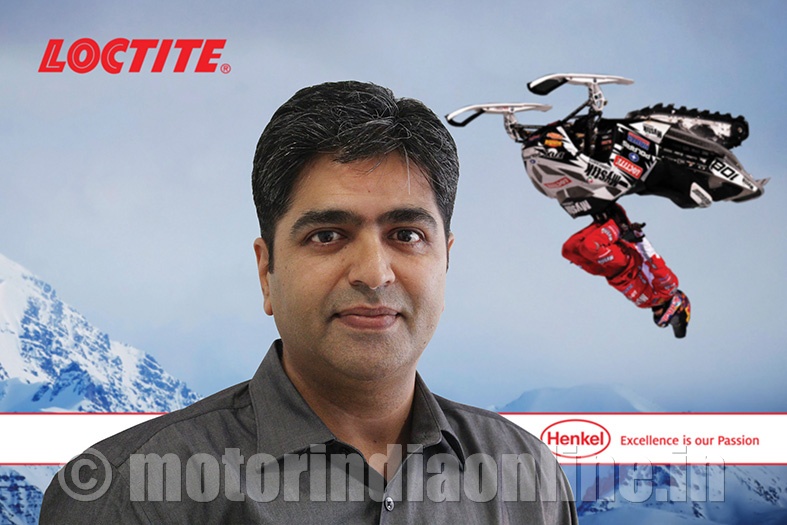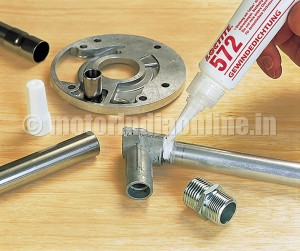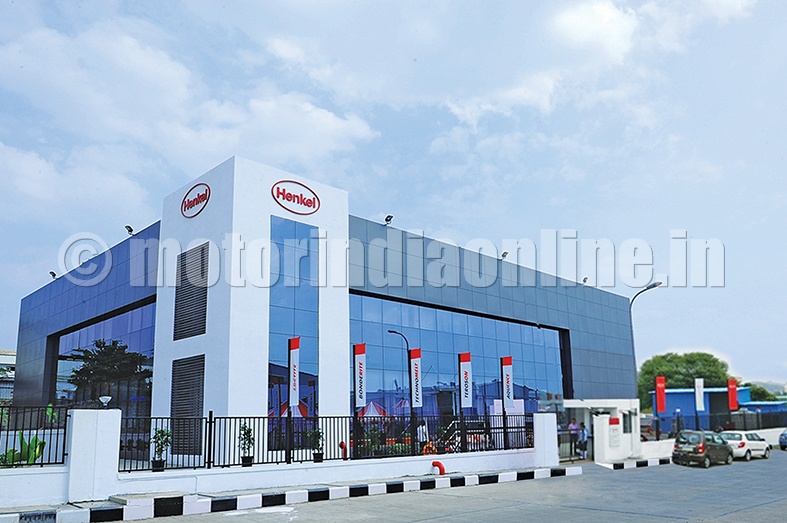Well poised to retain numero uno status
Henkel Adhesive Technologies India (Henkel India), a subsidiary of Henkel AG & Co KGaA of Germany, is the market leader in adhesives, sealants and functional coating across general industries, transport and metals, and packaging and consumers goods. Henkel, as a group, has been able to maintain the numero uno position on the back of a solid performance in the second quarter of 2015.

Mr. Kasper Rorsted, Henkel CEO, stated: “In the first half of 2015 we were able to increase sales by almost 1.1 billion euros to more than 9.1 billion euros. It has to be noted that, in the second quarter of 2015, overall sales for Henkel rose to a double-digit by 13.5 per cent to 4,695 million euros. Adjusted for positive foreign exchange effects of 7.3 per cent, sales improved by 6.2 per cent. Organically – i.e., adjusted for foreign exchange and acquisitions/divestments – sales rose by 2.4 per cent.”
The results are even more impressive in the emerging markets where Henkel has 55 per cent of its employees and manage to get 45 per cent of its total sales. “In the emerging markets of Eastern Europe, Africa/Middle East, Latin America and Asia (excluding Japan), sales grew significantly, by 11 per cent, to 2,047 million euros. Driven by all business units, organic sales grew by 5.1 per cent and made an above-average contribution to the organic growth of the Henkel Group,” said Mr. Rorsted.
Solutions for emerging markets
Mr. Pradhyumna Ingle, Business Director, General Industry, Henkel India, said: “The major applications of adhesives and sealants in India are in industrial manufacturing and maintenance, automotive, construction, packaging and furniture. The growth of smart phones, white goods, passenger cars and commercial vehicles, along with increasing penetration of lightweight materials, the need for improving productivity and production reliability, awareness regarding NVH (noise, vibration and harshness) and plastics are expected to boost the adhesives industry.”
For the uninitiated, adhesives are used to eliminate mechanical joining methods such as welds and rivets for making vehicles and industrial equipment lighter, safer and more reliable, while sealant is a material used for sealing two components to make them air tight, water tight or gas tight.
To pursue its mission of providing reliable and sustainable solutions to the Indian market, Henkel India inaugurated its first innovation centre in the country at Pune in October 2013. A stroll across the 27,000 sq.ft. innovation centre during a recent visit makes it clear that this centre will further strengthen Henkel’s focus in the emerging markets. “More than 800 industrial OEMs will directly benefit from this centre since it is located in one of the largest automotive and industrial hubs, Pune,” exclaimed Mr. Ingle.
At the inaugural ceremony, Mr. Jeremy Hunter, President, Henkel Group in India, had observed: “By 2016, Henkel expects to grow sales to 20 billion euros, of which 10 billion euros is expected from the emerging markets like India. This Innovation centre will nurture a strong mix of global expertise and local know-how to benefit customers across the automotive and transportation industry in the region as well as South Asia, Middle East and Africa.”
Going by the Q2 results of 2015 and innovative products in the form of Loctite, Teroson, Bonderite, Technomelt, Aquence, etc.; in its basket, Henkel looks right on the track to achieve its target by 2016.
Technical finesse
For the automobile and general industry portfolio, the laboratory at the Pune innovation centre is well equipped with the needed facilities, including a simulated environment for automotive acoustic structures. The NABL-certified lab boasts of state-of-the-art machinery to aid different manufacturing processes. The machines include differential scanning calorimeter, IR spectrometer Alpha, high resolution microscope, rheometer for material stability and rheology, salt spray chambers, climatic chambers, etc. It also has several dispensing equipment for various applications that Henkel offers to clients for automating their operations. As the world’s number one in adhesives, sealants and functional coatings, Henkel has a strong footprint of 170 manufacturing and 10 major R&D centres across the world.
The company boasts of 3000 plus products over the 139 years of its existence. One wonders if any new combination or scope for innovation still remains. Emphasizing the importance of innovation, Mr. Ingle stated: “We might have 3000 plus products, but it is not necessary that every existing product will fit a client’s requirement, which keeps on changing. So whether the innovation is completely new or incremental, it is a must. Innovation starts with evolving customer needs.”
He cites an example of the smart phone industry. There was a time when mobile phones were actually becoming smaller and Henkel as a company had solutions to glue keypads to mobile frames. In the last six years the smart phone revolution has actually seen phones becoming bigger again and solutions to stick keypads is no longer required. “In fact, we now offer solutions to stick display screens to mobile phone frames”, he added.
The quest for innovation, as understood, comes always from customers’ requirements. Another such example is Henkel’s latest innovation in its most popular Loctite brand – PC 7000 developed at the Pune innovation centre. This polymer composite solution is sustainable and safer for the user as well as for the environment.
Application-based solutions
The high temperature abrasion resistant coating Loctite PC 7000, used for protecting components against abrasion upto 1100°C, primarily finds application in coal power plants. In these plants coal has to be fired into a boiler which boils the water and generates steam. The steam generated moves the turbine and generates electricity. It is observed that when the coal is fired at an approximate speed of 100 tons per hour, since it is very abrasive, it eats into the nozzle that it is fired through. These nozzles made of stainless steel start losing their profile and eroding within three-four months.
Explaining the application of Loctite PC 7000, Mr. Ingle stated: “The power plants cannot take a break every 3-4 months, to disassemble the worn out nozzles and replace them with new ones. Though it is not an infinite coating, when Loctite PC 7000 is applied to the nozzles, it protects the original steel surface from damage and helps the power plant to extend the life of the nozzle up to 2 times.”
The product not only extends the life up to 2 times but is also cost effective. “As the nozzle wears out, due to coal eating the tip, not all the coal is shot into the boiler effectively, which reduces boiler efficiency and increases coal waste costs. The Loctite PC 7000 coating maintains the original profile of the nozzle and prevents wastage of coal. In addition, the coating will protect the nozzle for a longer period of time, as compared to an unprotected nozzle, so maintenance shutdowns don’t have to be taken every 3 months”, stated Mr. Ingle.
The success of the product has helped it find application in mining and other industries too.
It is observed that in many applications in trucks and buses if one wants to stop the loosening of the nut and bolt, one typically uses mechanical locking devices. However these devices fail to address the root cause of loosening – the gap between nuts and bolts – and under vibration, the nuts and bolts start to loosen creating a risk.
“The very first application of the Loctite adhesive was thread locking. A drop of this anaerobic adhesive is applied between a nut and bolt, and it is then tightened. Anaerobic adhesives will only solidify in contact of metal and in the absence of air. The adhesive fills the entire gap leaving no air, and is in 100% contact with both the nut and bolt. This assembly will hold under most severe vibration and will open only when there is a rotational torque given to it,” beamed Mr. Ingle.
The few drops of adhesive that is applied eliminates the use of traditional locking devices and aids light weighting.
Another example of how adhesives create value for users is application in reefer and transportation containers where Loctite solutions are used for bonding of panels to the frame and superstructure. “With this solution we negate rivets, welding, fasteners, and bolts and go one step further to distribute the stress evenly across the frame when the adhesive is applied. The outside of a reefer container, which is used for advertising, will be free of nuts and bolts, which would have ruined the aesthetics of the branding done on the said surface. More importantly, adhesives improve productivity, ensure cost savings and increase the reliability of the final product”, said Mr. Ingle.
Training and distribution
Harnessing its huge resources in terms of knowledge and global experience, Henkel provides professional training programs for customers proactively. It helps both Henkel and the customers identify opportunities for improving process efficiency and quality and reducing costs.
He further observed: “Not all our customers and their workforce are trained in the correct use of adhesives. We train them in the correct methodology of identifying the right product and the application of adhesives. We also conduct customized programs for maintenance engineers, meant to improve the reliability and performance of the equipment that they are responsible for. The trainings start with basics of adhesive engineering and then move to more advanced levels. We also cover common causes of equipment failure, how to go from reactive to proactive maintenance and hands-on training with the product for the customers. They become aware of the problems and learn to solve them on their own in the future.”
It is obvious that Henkel tries to create newer markets and customer awareness through training of the end users. “With our educative programs, which includes both classroom interactive explanation to hands-on demonstration on shop floors, we train around one lakh adhesive users annually across the world,” he added.
Henkel boasts of 11,000 distributors at the global level, spread across 41,000 locations, who hire one lakh sales representatives to reach 20 lakh indirect customers. On its own, Henkel, with 1,700 sales representatives, serves 15,000 direct customers.


